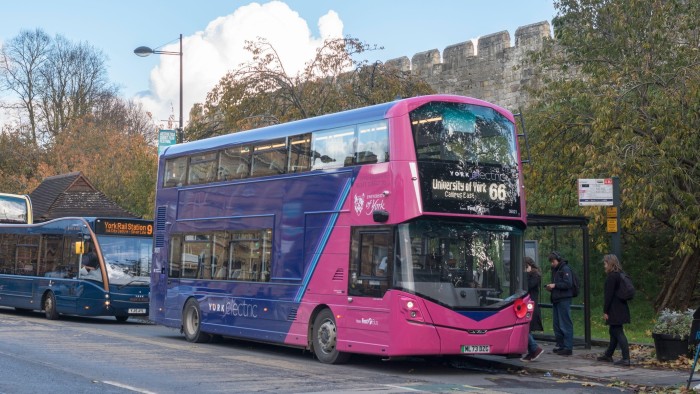UK investigates whether buses made in China can be turned off from afar.
The investigation comes after Norway discovered that Yutong vehicles might be’stopped or rendered unusable’ by a Chinese corporation.
Please use the sharing options available through the share button at the top or side of articles. Copying articles to share with others violates FT .com’s terms and conditions and copyright policy.
To purchase additional rights, please email licensing@ft.com. Subscribers can share up to 10 or 20 articles per month using the gift article service. Additional information can be found here.
The UK government is looking into whether hundreds of Chinese-made electric buses on British roads can be remotely deactivated, in the latest proof of Beijing’s influence over the country’s infrastructure.
Transport officials are collaborating with the National Cyber Security Centre to determine whether Yutong, the world’s largest bus manufacturer, has remote access to its vehicles’ control systems for software upgrades and diagnostics.
The investigation followed a Norwegian investigation that revealed Yutong buses might be “stopped or rendered inoperable” by the Zhengzhou-based corporation.
These discoveries have also spurred Denmark to conduct its own investigation. Yutong has provided over 700 buses to the UK market, especially in Nottingham, South Wales, and Glasgow, which are operated by companies such as Stagecoach and First Bus.
The company hopes to sell additional cars in London, where it has created a double-decker electric bus that meets Transport for London’s criteria.
The Department for Transport is investigating the case and working with the UK’s National Cyber Security Centre to understand the technical basis for the actions taken by the Norwegian and Danish authorities.
Workers assemble a bus in Yutong’s factory in Zhengzhou, Henan Province, China. © Li Chaoqing/China News Service/VCG via Getty Images.
TfL stated that none of its operators used or ordered Yutong buses, and that any buses entering service in LYutong told the Sunday Times newspaper that it “strictly complies with the applicable laws, regulations and industry standards of the locations where its vehicles operate”.
It went on to say, “This data is only used for vehicle-related maintenance, optimisation, and improvement to meet customers’ aftersales service needs.” Storage encryption and access control mechanisms ensure the data’s security.
No one is permitted to access or see this information without the customer’s permission. Yutong strictly adheres to the EU’s data protection rules and regulations. Yutong did not immediately respond to a request for additional information on Sunday.
Ruter, Oslo’s public transport provider, announced last month that it had tested a new Yutong bus and a three-year-old one from Dutch manufacturer VDL in an underground mine to see if they might be hacked or used for intelligence.
Ruter discovered that the Chinese company had remote access to its bus, which included the battery and power supply control systems.
The VDL bus lacked the same remote access. “In theory, the [Yutong] bus could therefore be stopped or rendered inoperable by the manufacturer,” according to Ruter. Ruter claimed it could maintain local control over the Chinese bus by removing its sim card, as all connectivity went through it.
Movia, Denmark’s largest public transport firm, has stated that it is also evaluating the concerns, but that the problem is not limited to Chinese buses and is common to many electric vehicles, including those manufactured in Western countries, whose software may be remotely updated.
However, the UK’s relationship with China has become tight, making any such weaknesses politically sensitive at a time when lawmakers are discussing whether Beijing is a “enemy” or a “threat”.
Labour MP for Falkirk, Euan Stainbank, has urged UK government to evaluate the risks of Chinese-made electric buses.
“It is becoming increasingly clear that there is potential for the quantity of Chinese-manufactured electric buses on UK roads to represent a national security risk, as suppliers could be able to remotely access and exploit vehicles’ control systems while in transit,” the politician stated.
Read more on Straightwinfortoday.com


Comments are closed, but trackbacks and pingbacks are open.